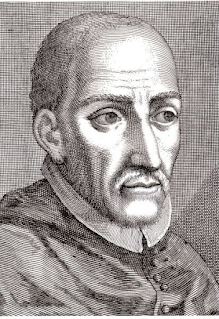Today's Readings
Editor's Note: At St. Francis College, we aim to teach and imbue Franciscan values throughout our community in a variety of ways. One of the avenues that we feel brings these values to life in a meaningful and memorable way is storytelling. The following is from Saints Resource. It contains an account of Saint Turibius of Mogrovejo, whose feast is celebrated today. The life of a saint may seem unattainable, blanketed in the mystery of holiness. Yet, when we hear and read their stories, we see that the saints were real people making real decisions at particular times in history. Bottom line: we are also real people making real decisions at a particular time in history - our lives can be saintly, too, as we hold to the same values, unwavering in faith.
Imagine how your life would change if you had to move to an unknown land more than 6,000 miles away! That’s what happened to Turibius of Mogrovejo, born in 1538. He was a respected judge and law professor Spain. One day, King Philip II, who was head of the Church in Spain, appointed him Archbishop of Lima, Peru. Turibius told the king and the pope that he had never even been to South America and that he was not even a priest! But the decision had been made. The Church in Peru needed a holy man to lead the people closer to Christ. Turibius was ordained a priest and a bishop, and he soon set sail for his new land.
When he arrived in Lima, he was shocked at what he found. Priests were not caring for their people. The poor were being neglected. Rich Spanish landowners had enslaved many of the native people of Peru and treated them cruelly. Turibius saw that there was much work to be done.
Turibius decided to visit every parish in his new land. Sometimes he rode a mule from place to place, but mostly he traveled on foot. His journey through the diocese took him seven long years. At every parish, he gathered the people to celebrate the Sacraments. He preached about God’s love and how to follow Jesus. He slept on dirt floors in the homes of Catholic families, and he ate whatever food the poor but faithful people could provide. He learned the different languages spoken by his people so that he could speak to them in words they could understand.
Turibius responded to the needs he saw. He supervised the building of many churches, schools, and hospitals. A catechism was written in different Peruvian languages so that adults and children could grow in their faith and also learn how to read and write. The first seminary in the New World was opened in Lima in 1591 so that new priests could be trained. Everywhere he went, Turibius spoke out against the unjust treatment of the poor. The people in power listened to Turibius because he always spoke with love and he encouraged everyone to act with love.
Turibius died in 1606 while visiting one of his parishes in a small mountain village. He was canonized in 1726. We honor him as a saint because he responded to God’s call to serve others. Like Jesus, he was a good shepherd for his people. We can follow Turibius’ example by respecting people from all cultures and treating everyone as a child of God.


Mogrovejo is in northern Spain (small village) that had 44 inhabitants in 2008.
ReplyDelete